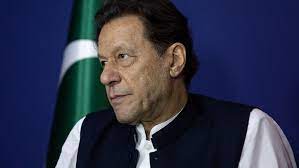Former Pakistani Prime Minister Imran Khan was ousted in a no-confidence vote. Pakistan is divided ahead of election as old dynasties fight for power and Imran Khan remains in jail.
Imran Khan, once seen as Pakistan’s army’s golden boy, was ousted in a no-confidence vote widely seen as orchestrated by the armed forces. The Zeshaan household has a ground rule preventing conversations about politics when the family gets together, which was established shortly after Khan was elected Pakistan’s prime minister in July 2018. Khan was elected after he vowed to fight corruption and fix the ailing economy. However, he has been fighting a series of cases since he fell out of power in 2022. Several criminal convictions have now barred him from standing in general elections on Thursday. The 71-year-old claims these are politically motivated to boot him off the ballot.
Khan is known for his political ideals of an Islamic welfare state (Riyasat-e-Madin), but his father disapproves of him due to his perceived close ties to the military at the start of his political career. The military is widely regarded as Pakistan’s most powerful institution and has deep influence on its politics. No prime minister in Pakistan has ever finished a five-year term, but three out of four military dictators were able to rule for more than nine years each.
Tensions between both sides emerged once Khan was in office, with tensions arising over the appointment of the head of the country’s intelligence agency. Khan was ousted in a no-confidence vote that he alleges was backed by the US in a “foreign conspiracy” that also involved Pakistan’s military. Both the US and the military have rubbished these allegations.
Many Pakistanis are frustrated that his economic and anti-corruption pledges have rung hollow, but his popularity has not waned even from behind bars. A Gallup opinion poll in December showed his approval ratings stand at 57%, putting him narrowly ahead of rival Nawaz Sharif with 52% of the votes.
Imran Khan, a former Pakistani Prime Minister, has been accused of sparking a political awakening by portraying himself as a “change candidate” who promised to end dynastic politics. This is attributed to the Pakistan Muslim League (PML-N) and Pakistan People’s Party (PPP), two political families that have dominated Pakistani politics for decades. In 2022, they united to topple Khan and his PTI. The PML-N candidate, Nawaz Sharif, is widely expected to win the election and become prime minister for a record fourth term.
Khan was ousted from his second term in a 1999 military coup and sentenced to life imprisonment on charges of hijacking, terrorism, and corruption. He returned to Pakistan from exile in Saudi Arabia in 2007, and was elected prime minister for a third time in 2013. He was removed from power in 2017 following a corruption investigation related to the Panama Papers and was sentenced to seven years’ jail in a separate graft case a year later. This paved the way for Khan to become prime minister.
However, some observers allege that Khan’s politics are nothing more than rabble-rousing and populism. Some believe that Khan’s biggest offence was challenging the military, which has long been the ultimate arbiter of politics in the country. Other former prime ministers have fallen out with the army in the past but few have come as close to Khan in dividing loyalties there.
Retired military officers have spoken against the army’s political interference, alleging that this has sparked a crackdown by military leaders against them. Some retired military officers have told the BBC they were implicated after Khan fell out of power for not supporting the no-confidence vote against him. Others claim they had their pensions and government benefits suspended, while others received threats that further action could be taken against them. Many have since gone quiet.
A spokesman of the military said last year that retired army officers are “assets of the army but they are not above the law”, warning also that they should not get involved in organizations that “wear the garb of politics.”
With Khan out of the running and the PTI dealt a big blow after Pakistan’s election commission banned its iconic cricket bat symbol from ballot papers in January, it may look like Khan has been effectively neutralized. However, political divisions across the country look set to deepen.
Conclusion
Pakistan’s former Prime Minister Imran Khan, known for his anti-corruption and economic ideals, has been ousted in a no-confidence vote, allegedly orchestrated by the armed forces. Khan, who was elected in 2018 after vowing to fight corruption, has been facing criminal convictions that have barred him from standing in general elections. Tensions between the US and the military have risen since Khan’s ousting in 2022. Despite his political ideals, Khan’s popularity has not waned, with his approval ratings standing at 57%. Retired military officers have also voiced concerns about the military’s political interference. With Khan out of the running, political divisions across the country are expected to deepen.



